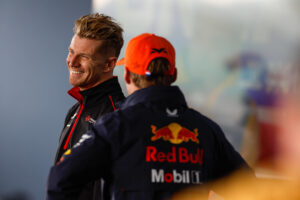BREAKING: Lewis Hamilton Protests Potential FIA………. Full story

Lewis Hamilton Protests Potential FIA Change with Strong Warning to Rivals
Silverstone, UK- Formula 1 star Lewis Hamilton has made his stance clear in the ongoing debate about introducing air-conditioning into F1 cockpits for extreme conditions. The seven-time World Champion issued a firm warning to his rivals, advocating against the move and emphasizing the sport’s inherent demands.
The discussion about cockpit conditions gained traction after last season’s Qatar Grand Prix at the Lusail International Circuit. Drivers faced extreme heat, leading to serious consequences: Logan Sargeant had to retire due to heat stroke symptoms, while Esteban Ocon vomited inside his helmet but continued to race. These conditions sparked intense conversations about driver safety and led to the testing of an air-conditioning system to alleviate the heat during similar conditions.
However, Hamilton is not in favor of this innovation. “It’s not needed,” he stated unequivocally. “This is Formula One. It’s always been like this. It’s tough in these conditions. And we’re highly paid athletes. You’ve got to train your ass off to make sure you can withstand the heat, ultimately. It’s tough. It’s not easy, especially when you go to places like Qatar and Singapore. But I don’t think we need an AC unit in the car.”
Hamilton’s comments echo his stance from last year’s Qatar Grand Prix. Despite crashing out on the opening lap after contact with his teammate, Hamilton suggested that F1 should remain an “extreme sport.” He elaborated, “I’m going to be controversial as always. Obviously, I didn’t do the race, so didn’t get to feel the pain that the drivers felt. But I have obviously been here a long time. Malaysia was much hotter than that race, and I know what it’s like to lose four or more kilos in the race and barely being able to stand afterwards. My feeling towards it is… this is an extreme sport. You don’t have marathon runners who are passing out after the marathon, saying you have got to make it shorter.”
The debate over cockpit conditions isn’t new, but the Qatar Grand Prix’s extreme heat brought it to the forefront. The FIA’s consideration of an air-conditioning system aims to enhance driver safety in such conditions. However, Hamilton’s opposition highlights the tension between maintaining the sport’s traditional challenges and adapting to new safety measures.
Despite Hamilton’s protests, testing of the air-conditioning system will continue. At the Dutch Grand Prix after the summer shutdown, one car will be fitted with a prototype unit. The FIA announced, “Initial tests and in-situ proof of concept are planned to take place in Zandvoort and upcoming races. If these tests prove successful, the FIA will mandate the installation of such an active cooling system in Formula 1 cars in the future when a heat hazard will have been declared.”
Hamilton’s perspective adds a critical voice to the debate. His argument is rooted in the belief that the extreme conditions are an essential part of what makes F1 a top-tier sport. He insists that elite athletes should be prepared to handle these challenges through rigorous training and conditioning.
His comments have sparked discussions among fans and experts alike. Some agree with Hamilton, valuing the traditional toughness of the sport, while others emphasize the importance of evolving safety measures to protect drivers’ health.
As testing continues, the future of air-conditioning in F1 cockpits remains uncertain. The results from Zandvoort and subsequent races will be crucial in determining whether this innovation becomes a standard feature in the sport. Meanwhile, Hamilton’s warning serves as a reminder of the ongoing debate about the balance between maintaining the sport’s traditional rigor and ensuring driver safety.
The coming months will be pivotal in shaping the direction of this discussion. Whether or not the FIA’s proposed changes come to fruition, Hamilton’s outspoken stance ensures that the conversation about what constitutes the essence of Formula 1 will continue.





